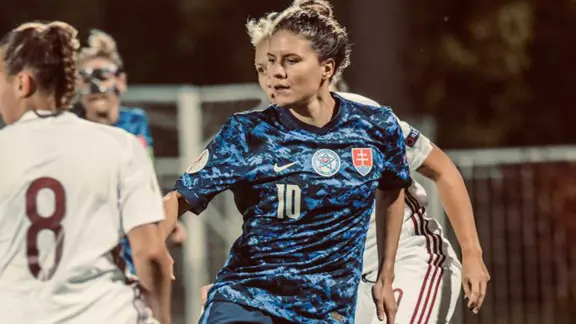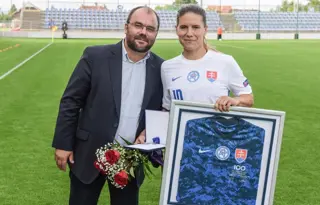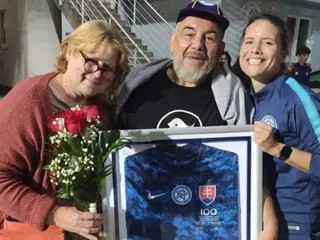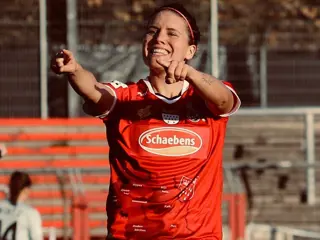Player Story
Lucia Ondrusova: "How a mental health coach made a positive difference in my life"

Lucia Ondrusova
Lucia Ondrusova was the first player to achieve 100 caps for Slovakia. Before retiring last year, the 35-year-old had played for European clubs Sparta Prague, Koln, Basel, Hellas Verona and Neunkirch.

There was one season in my career as a footballer that my team had lost a few games in a row. We reached a point where we really had to start winning to stay in the league. It felt like every point had a make-or-break potential.
The pressure was enormous and I carried it with me after every game. In the mornings, I just had this feeling that I couldn’t get out of bed. I just couldn’t push myself into work feeling like this and have a coach shout at me and my team-mates when I was so close to breaking point.
Of course, I did get up. I pushed through. I went to training. I gave it my all. But it wasn’t enough. My head wasn’t in the right place for me to perform at full capacity. It didn’t matter how hard I pushed, I just wasn’t mentally fit at that moment in time.
There is so much care taken to prevent physical injury in football, anything that might hinder our performance or shorten our career, but sometimes we forget that our mental health is also crucial to our game; if you feel well, you play well, if you feel good, you play better.
When I moved to AC Sparta Prague, a club that I had previously been so comfortable at, I had a really hard time fitting in. It got to the point where I was noticeably not performing and people started to ask what was happening with me. I just couldn’t describe it. I then realised I needed professional support to regain a healthy mentality and continue playing.

Unfortunately, a mental health coach wasn’t a service that was available at the club and many of the other players and staff didn’t see the need for one. It was something I had to pursue in a private capacity. It made a huge difference for me.
The results weren’t immediate. It took time and practice. But eventually, I was able to see some real benefits – just as you would if your goal was to strengthen your body instead of your mind.
It made me realise how little we discuss mental health in a professional capacity as footballers, and the potential for improvement that introducing a mental health coach into a club environment could bring. Players shouldn’t be afraid to say they don’t feel good; they should feel safe enough to acknowledge that there’s an issue, and then be supported as they take the necessary steps to address it – just like with any other health problem.
Of course, as players we can discuss amongst ourselves how we are feeling, but we don’t have the tools to solve our problems in a professional way. Our employers should care about our minds as much as our bodies, especially as, in my experience, it’s responsible for more than 50 percent of our performance.
On the national team we have access to a mental health coach and as players, it’s something we are extremely grateful for. It was strange in the beginning as we had never experienced anything like it. I remember being so nervous in our first group session to speak out when asked if we had any issues.

I wasn’t used to interacting in this way, so I had no idea what to expect, but as soon as I opened my mouth and started to talk, I already felt a huge weight lift from my shoulders. I had just taken the first step to open communication with my team and it felt amazing, even more so when we starting to work on our issues together.
The coach has helped the team a lot, creating a healthy space to communicate as a squad. It’s something I would love to see implemented at club level in Slovakia and, of course, everywhere else.
I recently retired from professional football, so these improvements would be for future generations rather than my own benefit. I can’t help but wonder, though, how different things might have been had a mental health coach been available earlier in my career.
Shortly after retiring, I made the decision to publicly come out as gay. It wasn’t football that stopped me from openly sharing this side of myself, but rather a fear of rejection from my parents. Once I stopped playing, I decided I didn’t want to keep this secret from them anymore.
It was an emotional process for me and such a relief when they said they still loved me. Deep down I always knew that would be the case, that they would just need time to adapt and that they would never reject me. But until I actually told them, the fear was always there. Now, simply hearing them say my girlfriend’s name out loud and asking after her might seem like a small step but, to me, it means the world.
Although it wasn’t football that stopped me from sharing this side of myself, I do wonder: would things have been different if my mental health was in a better place during my career, if I had a healthier way of dealing with the stress of playing, if perhaps I would have had the capacity to process this at the same time?
I have always been a footballer. I have always been gay, even if I tried to deny it at some points in my life, and coming out hasn’t changed me as a person. But keeping this part of my identity secret impacted my performance as a player, just as it did other aspects of my life. I thought about it every single day.
I wish no-one had to come out. I wish we could all automatically accept each other no matter who they love but, unfortunately, that’s not the world we live in right now. For me, I know I made the right decision when I chose to share this side of myself. I just wish I had been ready sooner.
I wish I could have announced that I was a gay Slovakian footballer and maximised whatever platform I had to humanise homosexuality in any way I could. Right now, especially in Slovakia, there is such a negative political and social sentiment towards the LGBTQIA+ community, and I think it’s important for footballers to be part of the conversation against that.
People praised me for my bravery when I came out, but that’s not something I wanted to hear. In a safe environment you wouldn’t need courage to be who you are, and love who you love. For me, mental stability and open conversation are such important factors in creating this.
I have always loved to play. Being a footballer is who I am. I have felt like myself throughout almost all of my career, but had I received what I now consider to be the necessary mental support, I think I would have struggled a lot less.
My hope is that young players in today’s game don’t have these same questions when the time comes to hang up their boots, and that we learn to talk about mental health as a fundamental factor of football. If we can do that, I think we unleash a huge potential for progress on and off the field.



